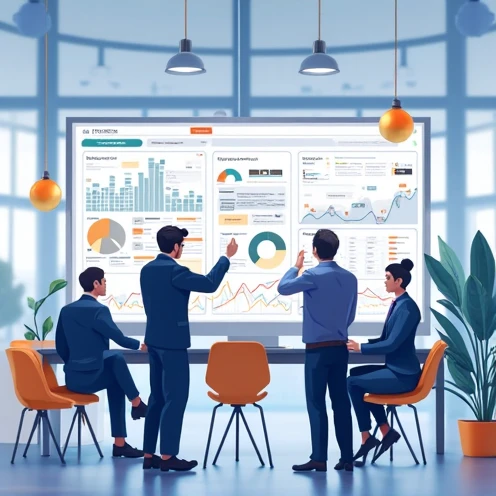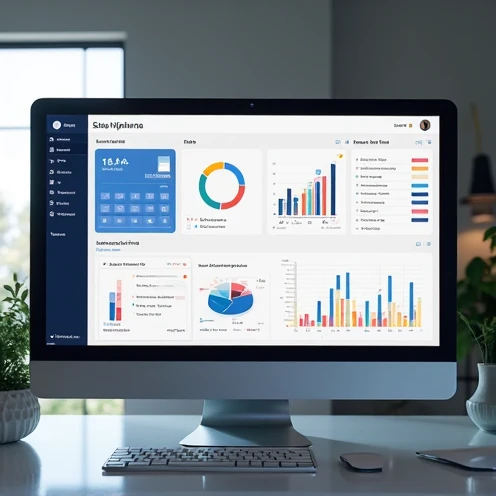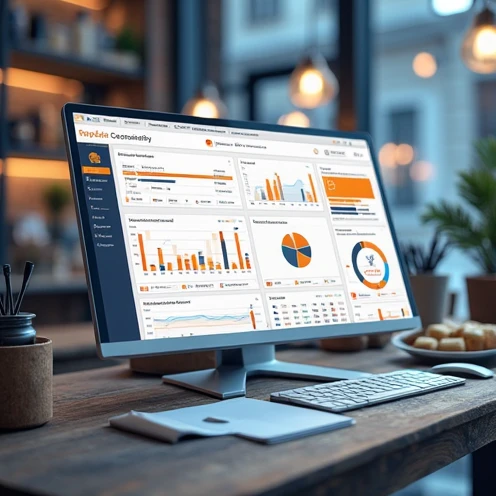What Is Enterprise CRM and Why It Matters
Enterprise CRM—short for Customer Relationship Management at the enterprise level—is more than just a contact database. It’s a robust system that unites sales, marketing, support, and analytics in one centralized platform. Its purpose? To help companies build stronger customer relationships, streamline operations, and grow with confidence.
Iklan Google AdSense
Built for scalability, enterprise CRM tools handle massive datasets and multiple teams across different departments. That’s why businesses aiming for long-term success invest in these platforms—to stay competitive, organized, and informed.
The Core Benefits of Enterprise CRM for Large Organizations
Modern enterprises often deal with fragmented systems. With enterprise, you eliminate data silos. Customer information, purchase history, communication records—all accessible through a unified interface.
Iklan Google AdSense
This integrated view leads to smarter decisions, better collaboration, and personalized customer experiences. It’s not just about selling; it’s about creating value at every stage of the customer journey.
Key Differences Between Standard and Enterprise CRM
While traditional CRMs serve small teams or individual users, enterprise CRM caters to complexity. It supports large sales pipelines, tiered permission access, custom workflows, and advanced analytics—all without compromising speed.
Enterprise solutions are also highly customizable. You can tailor them to industry-specific needs like manufacturing, healthcare, or finance.
How Enterprise CRM Enhances Sales Performance
Enterprise CRM automates repetitive tasks like follow-up emails, task reminders, and meeting scheduling. This gives sales teams more time to focus on closing deals.
With real-time visibility into the sales funnel, managers can forecast revenue, identify underperforming reps, and fine-tune strategies on the fly.
Supercharging Customer Service Through Centralized Data
Support teams often waste time jumping between platforms. Enterprise CRM simplifies that by bringing everything into one place—past issues, live chats, email threads, and even product usage logs.
This allows agents to resolve tickets faster and with more context. The result? Happier customers and fewer complaints slipping through the cracks.
Advanced Marketing Automation with CRM Tools
Enterprise CRM platforms often include built-in marketing automation features. You can segment audiences, personalize messaging, and trigger campaigns based on customer behavior.
Imagine sending birthday offers automatically or retargeting users who clicked on an email but didn’t convert. These actions are made easy through dynamic workflows inside the CRM.
Actionable Insights from CRM Analytics
CRM dashboards offer a bird’s-eye view of key metrics. You can track campaign ROI, customer lifetime value, or conversion rates without needing separate tools.
Armed with these insights, decision-makers can test, optimize, and adapt strategies—ensuring resources are spent wisely.
Integration Capabilities That Unify Tech Stacks
Your enterprise CRM must play well with others. Leading platforms offer seamless integration with tools like Slack, Zoom, Google Workspace, ERP systems, accounting software, and more.
This connectivity reduces errors, avoids manual duplication, and creates a frictionless workflow between departments.
Cloud Access and Mobile CRM for Modern Teams
Gone are the days of being chained to an office. Enterprise CRM apps are now mobile-friendly and cloud-based, allowing remote teams to stay productive.
Sales reps can log calls on the go. Marketers can check campaign stats from a tablet. Executives can review dashboards during travel. It’s CRM without limits.
Custom Workflows and Role-Based Access
Enterprises have layered processes and approval chains. With enterprise CRM, you can build custom pipelines that reflect real-world operations—whether it’s for a B2B sales cycle or a customer complaint resolution process.
Access control is equally vital. Team members only see what’s relevant to their role, keeping sensitive data secure.
Choosing the Right Enterprise CRM for Your Business
No two CRMs are alike. When evaluating your options, consider factors like ease of use, integration capability, support quality, and data security.
Look for a solution that aligns with your business size, growth plans, and budget. Better yet, opt for a platform with trial periods so your teams can test it first-hand.
Mistakes to Avoid When Implementing Enterprise CRM
Many companies underestimate the importance of training. A powerful CRM is useless if your teams don’t know how to use it. Invest in onboarding and provide ongoing support.
Another misstep is failing to maintain clean data. Duplicate contacts, outdated emails, or inconsistent tagging will undermine your CRM’s effectiveness. Make regular audits a habit.
The Future of CRM: AI, Voice Assistants, and Predictive Tools
AI is reshaping enterprise CRM by automating data entry, offering lead scoring, and even recommending next steps for reps. Predictive analytics can highlight which customers are likely to churn—so you can act early.
Some systems are beginning to support voice commands. Imagine asking your CRM, “What deals are at risk this month?” and receiving instant insights.
Real-World Use Cases: Enterprise CRM in Action
A global e-commerce brand used CRM automation to recover abandoned carts, increasing revenue by 15%. A logistics firm integrated its CRM with fleet tracking software to resolve delivery issues faster.
These real-life examples show how enterprise CRM isn’t theoretical—it’s a powerful tool driving real-world results.
Iklan Bersponsor Google






